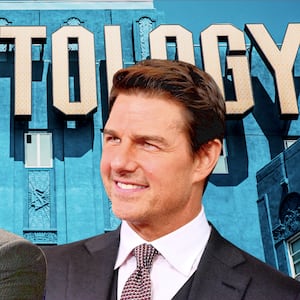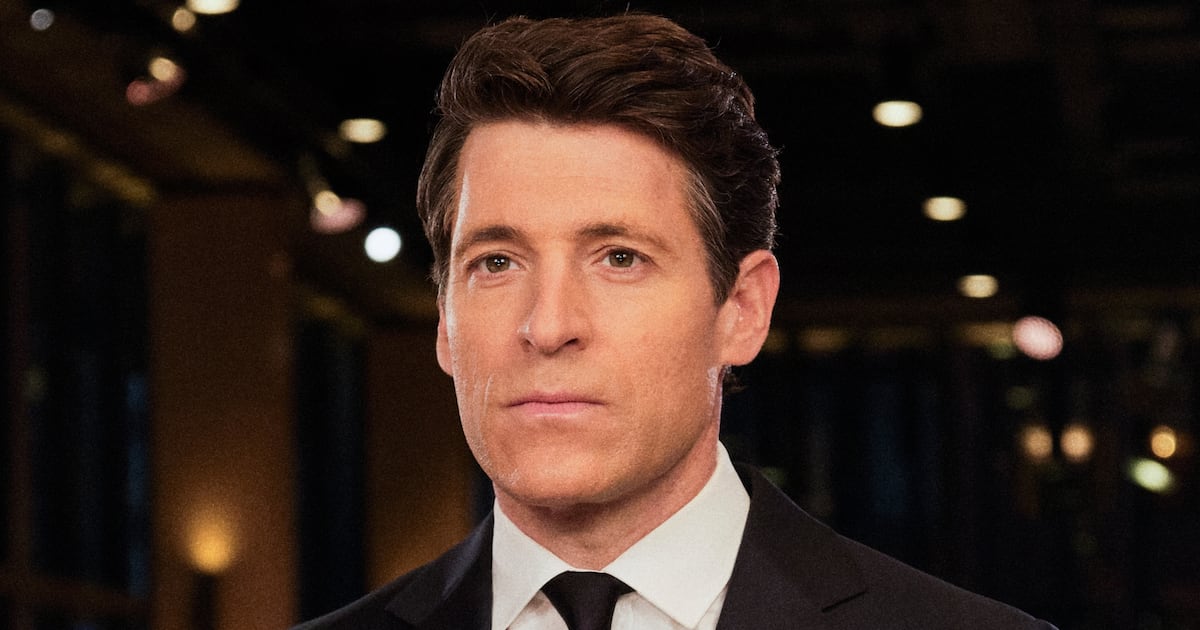Tom Cruise is many things. He is among our greatest living movie stars, in the traditional and best sense of that term, and a pleasure still, all these decades after his Risky Business breakout, to watch on screen.
At 56, he is a marvel of aging, a practical world wonder executing outrageous stunts of escalating danger, year after year (a flash of that dashing, confusingly youthful smile its own veritable human special effect).
He is the star of Mission: Impossible—Fallout, a film being gilded an action masterpiece, with critics straining their vocal chords cheering how it wows, thrills, and even “fucks.” It comes out this weekend, and it is very good!
Cruise is also a Scientologist. Did we remember that? I mean, of course we remember that. It’s arguably the first thing someone thinks of when they think about Cruise at this point: his longtime stature as a high-ranking member and proponent of the Church of Scientology and his close relationship with its leader, David Miscavige. But I’m just checking because, as Cruise takes his victory lap on this fawning press tour, the organization seems to be receiving nary a mention.
Listen, a person of Cruise’s stature and with such controversial baggage is never going to embark on a press tour that consists of anything but puff pieces and softball interviews adhering to warnings about forbidden questions and topics (chiefly: Scientology!). But that doesn’t make its erasure any less aggravating, the media complicity in fostering an inaccurate image of an influential member of a reportedly oppressive organization any less irresponsible, and our collective willingness to accept all of this in the name of enjoying a badass movie any less damning.
For example, there’s his appearance on Jimmy Fallon’s Tonight Show, which, I know, is not the venue that is going to interrogate Tom Cruise on the intricacies of Scientology’s greatest atrocities, but is, you know, almost laughably endearing. He participated in a “Mad Libs Theater” bit with Fallon, and as headlines raved, couldn’t keep a straight face! “He can jump out of planes and save the free world from attackers, but Tom Cruise couldn’t seem to hold it together on Monday’s episode of The Tonight Show,” wrote one recapper.
Then I came upon this week’s People magazine cover, which teases in its headline that it will take me “Inside HIS PRIVATE WORLD” for “a revealing look at the life of Hollywood’s most mysterious star.” Oh snap! It turns out Cruise was even interviewed for the piece, a piece which opens with the actor saying, “I’ve wanted to make movies since I was 4 years old…To be able to entertain an audience, that was my dream.” Oh…snap.
The jumbo-sized popcorn bucket of puff pieces—discussing how he’s single, that he sold his Beverly Hills compound, that he’s more private than ever—does mention Scientology, to be fair, explaining that Cruise moved to Clearwater, Fla., a block from the Church of Scientology’s spiritual headquarters, in order to be closer to Miscavige. That is juicy! Not so juicy: the way in which the article normalizes the move.
Cruise is renovating a new apartment there, the article says. Locals have spotted him around town with other Scientologists. “He’s very relaxed when he’s here!” says one local. Just your friendly neighborhood figurehead of an allegedly abusive organization.
The Clearwater Scientology headquarters, for those in need of a recap, is known as the Flag Building, or Super Power Building. It is a facility where top-ranking Scientologists can receive a VIP course called the “Super Power Rundown”—a series of auditing processes that comes with a price tag of approximately $30,000 and, according to leading Scientology expert Tony Ortega, may promise its recipients “infinite power.” The tax-exempt Flag Building, with a value of $80-100 million, is not only the Church of Scientology’s most valuable asset, but once prompted a California couple to sue the Church, alleging that the religious organization let construction go unfinished on the building for years in order to “to use it as a shill to induce further payments from members.” The lawsuit suggested that the Church had raised $200 million for construction on the Flag Building (double its cited cost), while a Tampa Bay Times investigation put the fundraising at $145 million.
All of this is not to mention the reports from former Scientologists about being “disconnected” from families, forced labor, physical violence, and being stalked upon leaving the organization—an organization with headquarters near where Cruise just moved and seems, according to People, “very relaxed!”
(Neither a rep for Tom Cruise nor the Church of Scientology has responded to The Daily Beast’s requests for comment.)
Listen, this is not to blast anyone who enjoyed or will enjoy Mission: Impossible. Art is meant to be enjoyed, and this is hardly the only film to star someone with sketchy views. The argument that it’s not relevant to the film or to interviews about the film is fair, but, in our opinion, false. Press and interviews are all part of a star’s branding machine, and ignoring Cruise’s rank and influence as a Scientologist while spit-shining his brand is concerning.
All of these facts can co-exist and be true. Tom Cruise can star in the new Mission: Impossible and the new Mission: Impossible can be a fantastic film, and Tom Cruise can be a Scientologist and the Church of Scientology can be disturbing. He can be charming, both in these public-facing interviews and maybe in private, too, but also a part of an organization connected to these harrowing stories.
A great movie can have a problematic star. An actor’s affiliations shouldn’t necessarily prevent a career. Yet those affiliations are relevant to informing public opinion on a public figure. Cruise, let alone anybody, shouldn’t have to walk up to a reporter on a red carpet and be ambushed with whiplash questions about a crazy stunt followed by inquires into an organization’s allegedly abusive practices, all in a 15-second swoop. Still, both are worthwhile questions.
These are all things that we should dutifully think about, and how they relate to each other. (See also: Scientology member Elisabeth Moss’s work on The Handmaid’s Tale.)
Our instinct to compartmentalize this information or temporarily move it into storage in the back of our minds for the sake of enjoying a project or a person’s art is one of our worst tendencies. I’m so glad that Mission: Impossible is getting such great reviews—I love all of its actors and think Tom Cruise, again, is a great movie star—and hope that people take advantage of there being an excellent action movie to enjoy. But the glowing Tom Cruise press tour accompanying it is a glaring example of both media and culture’s worst tendencies toward erasure.
In my Googling to see what he’s said on this press tour, I was gobsmacked to see a Guardian headline come up from this week touting, “Tom Cruise interview: ‘Why am I a Scientologist? I like an adventure.’”
After cleaning up all the coffee I had just spit out, I read the first line in the piece, which explained that it is a republishing of an interview conducted in 1992. Yes, we have to travel back more than 25 years to find meaningful comments from Cruise on his involvement in the organization.
This is hyperbole, of course. He has talked about it since. But it does illustrate how long we in the media have been willing to accept any rules against asking about it in order to continue to have access to, and thus promote, the world’s biggest movie star.







